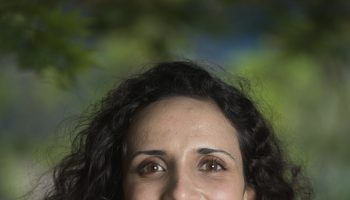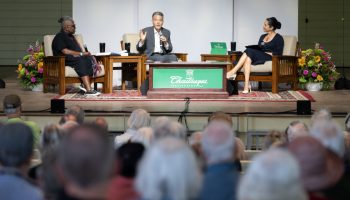
One aspect of Chautauqua that Denyce Graves-Montgomery came to quickly understand is the porches.
“It is all about the porches here,” she said. “… The porch isn’t just where you sit, but it is also where you network, where you perform, where you debate philosophy and where you schedule more meetings.”
Graves-Montgomery spoke at 10:45 a.m. Tuesday in the Amphitheater for the Chautauqua Lecture Series’ Week Three theme “Art in Action: Building Community Through the Arts.” An Emmy and Grammy Award-winning artist, Graves-Montgomery is an acclaimed mezzo-soprano, known for her role as Dalila in Camille Saint-Saëns’ Samson et Dalila and the titular role in Carmen. On top of her operatic success, she teaches at the Juilliard School, the Peabody Conservatory and at Chautauqua, serving as Chautauqua Opera Conservatory Artistic Advisor. In 2021, she established the Denyce Graves Foundation with the goal of celebrating overlooked musicians of the past and training the musicians of the future.
With a lifetime of stories about the power of music, on the Amp stage, Graves-Montgomery shared the importance of music and the arts in creating community.
For her, music and connection all started when she was a kid at church. Since her family made it a rule that they “couldn’t just go to church, but (they) had to be involved in the church,” Graves-Montgomery became the head of the bus ministry, which went door to door and invited children to Sunday School.
“One of my jobs, once I had the kids on the bus, was to entertain them while they were on the bus,” she said. “So we would sing songs.”
She then led the audience in a call-and-response song she would sing with the kids on the bus: “Oh, you can’t get to heaven in roller skates because you’ll roll right by those pearly gates.”
Through doing that job, Graves-Montgomery noticed something that she later saw as a pattern.
“I noticed right away the importance of music and how music could be a tool for connection,” she said. “Later on, as a music student, I noticed that whenever anything was important — whether it was a wedding, a funeral, a graduation, a religious service — music was center stage because music cuts right to our core and bypasses fear and speaks a universal language that reminds us we all belong to each other.”
Another core moment in Graves-Montgomery’s music journey was hearing the voice of soprano Leontyne Price.
“Oh, you’ve heard her, too?” she said to the audience with a knowing smile.
Graves-Montgomery then knew she wanted to become an opera singer — ultimately, having to acknowledge there is only one Price. During her time in school, she studied abroad in Germany, knowing little German and living with a family that knew little English.
One day, her German host father played a recording of Florence Foster Jenkins singing opera.
“For those of you who have not heard her sing, that is one of the most scariest, screeching sounds you can ever hear,” she said. “I tried to be polite, and I smiled and nodded, and finally I couldn’t take it anymore, and I broke out laughing and so did he, and I was relieved to find out it was a joke.”
Jenkins is famously known as a terrible singer, but even so, her music brought Graves-Montgomery and her host father closer together.
“Music transcended that language barrier,” she said. “It connected us.”
After college, Graves-Montgomery participated in a young artist program at Houston Grand Opera. While there, she sang everywhere from community centers to hospice as part of the opera’s outreach program.
One of the locations was at a prison. Graves-Montgomery started off quite scared, but as the group performed, she saw something important happen.
“Seeing some of those faces of stone as we performed began to lighten and began to lift, and people left smiling,” she said. “I remember saying to myself, ‘This is something important, Denyce. This is important.’ ”
Throughout her career, Graves-Montgomery has seen music’s impact.
“Whether on stage, in classrooms or within community circles, the work we do is not just about performance, or the art as an ornament, but as an instrument for justice, for education, for connection and for peace,” she said.
When Graves-Montgomery works with students, she thinks about the student as a whole.
“Voice is tricky, because you can’t see it, and you can’t touch it. There is no separation between the performer and the instrument,” she said. “That work requires you to feel deeply and to share openly, and that takes trust.”
As a faculty member at Juilliard, she realized how interconnected she became with her students.

“I thought of them constantly,” she said. “I dreamed about them. I spoke about them all the time. I worried about them. I cheered for their successes. And I cried with them at their heartbreaks. They were woven into my life, or I should say, our lives.”
When her husband would come home after his work in the operating room, he would enter a home filled with the sound of students singing scales. He would ask who these people were and how long they’d be there.
“My answer was, they will be here indefinitely,” she said.
When the COVID-19 pandemic began, she was struck with concern for her students, “her kids.” To connect with them, she hosted online classes, which eventually inspired the Denyce Graves Foundation.
“I founded the Denyce Graves Foundation as a way to address gaps of vulnerability in the music industry and to prepare my students for a new and changing world,” she said. “I felt responsibility to these young artists and to their parents, and I wanted to offer more than just scales — I wanted to prepare them to thrive in a world that is shifting fast, where artistic survival depends on adaptability, awareness and authenticity.”
Not only does the Denyce Graves Foundation work with young artists, it also “sits at the intersection of American history, social justice and the classical vocal arts.”
“We are dedicated to reshaping the narrative of classical music by amplifying the stories of artists who have been historically overlooked and by investing in the next generation of vocal talent through access, education and mentorship,” she said.
She shared about the three programs of the foundation: Hidden Voices, Generational Voices and Shared Voices.
Hidden Voices creates art that shares the stories of overlooked artists through opera, poetry, books and other media. Generational Voices targets advanced singers and provides them with both rigorous training and performance opportunities. Shared Voices works with conservatories and HBCUs “to create a more inclusive future for classical music,” she said.
Graves-Montgomery sees her work at Chautauqua as fitting into her work through her foundation.
“The Chautauqua Opera Conservatory is designed to guide and empower young artists through training and vast performance opportunities in a wide array of repertoire,” she said. “At the heart of the Denyce Graves Foundation and the Chautauqua Conservatory lies a shared belief that the arts are not a luxury, but a living language of connection.”
Two of the Denyce Graves Foundation Shared Voices’ students are currently Voice students at the Chautauqua Opera Conservatory. She emphasized that she never said that these were her students when they auditioned — they were chosen for their own merit.
Videos of Opera Conservatory students were then shared, featuring Sarah Butler, a student from the Juilliard School; Kerrigan Bigelow, from Juilliard; Kaytie Jeffries, from Jackson State; and John Orlovsky, a Shared Voices student.
One of Graves-Montgomery’s students from the Peabody Institute, soprano Aubrey Cole, then took the stage. But before she could sing, Graves-Montgomery had Cole share a story from when Cole when 3.
When Cole told her mom that Graves-Montgomery was her teacher, her mom asked her if she remembered seeing Graves-Montgomery sing opera on the PBS show “Between the Lions.” Her mom said, “You used to coo along to it every time she sang.”
Cole and her family relished in the full-circle moment.

Cole performed “Summer in the South,” with text by Paul Laurence Dunbar and music by Jeremiah Evans.
After her performance, a CBS News clip was shared, discussing the Denyce Graves Foundation’s Shared Voices program. In the video, Graves-Montgomery said that many of the best singers come from HBCUs, and the foundation wants to empower new singers from HBCUs today.
Tenor Justin Bell then stepped out onto the Amp stage and sang “Ain’t Got Time to Die” by Hall Johnson.
After he left the stage, Graves-Montgomery just shook her head.
“Come on,” she said. “You cannot tell me you are not in love with them.”
Graves-Montgomery is excited for the continuation of Shared Voices, with 18 in the upcoming cohort, and the impact the program will have on future singers.
“I believe when heart and soul is poured in, it can then withstand the trials of time and will continue to shine into the future, and that’s our goal,” she said.
She applauded the Chautauqua Opera Conservatory for its work.
“The Chautauqua Conservatory’s legacy is one of excellence, inclusivity and innovation,” she said. “By providing rigorous training and performance opportunities, it has shaped countless artists who contribute to the cultural fabric of communities worldwide. Its commitment to fostering talent ensures the arts remain a vital and dynamic force in society.”
She appreciates having Jonathan Beyer, director of the Chautauqua Opera Conservatory, alongside her in this journey.
“Together, we bring world-class artistic standard, rigor and excellence, and that sets a high bar for young artists,” she said. “Our personal experiences on the world’s greatest stages offer students a direct line to the demands, the disciplines and the joys of a real international career.”
Being on grounds at Chautauqua also offers Graves-Montgomery the chance to teach and connect in and out of the classroom.
“It happens while walking in Bestor (Plaza) or at the ice cream shop or during rehearsals or over coffee on a porch,” she said. “Being present allows you to spot those moments and to offer guidance and build trust with our young artists.”
She invited the audience to attend the Opera Conservatory’s events, which she and Beyer have thoughtfully planned. And while the students are rehearsing, she sees Chautauquans as rehearsing for how to build community in the world.
“Because community doesn’t just happen, it is built,” she said. “Voice by voice. Note by note and choice by choice. And the arts, they are not a decoration — they are the blueprint. So please, keep showing up. Let’s keep creating and fighting for a world where everyone has a place at the table and a verse in the song. The curtain is up. The stage is set. Let’s get to work.”




